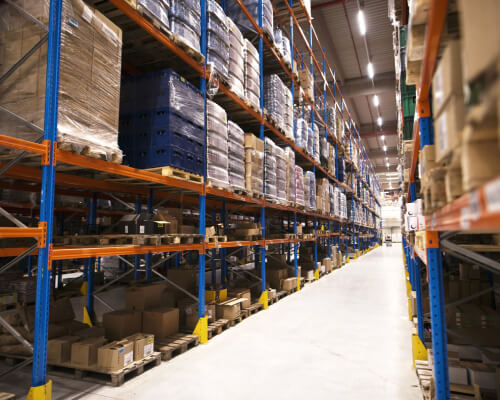


A "warehouse" refers to a space that allows you to store your goods safely until they reach the customer. Generally, the goods are produced in surplus to meet the demands, or perishable items need to be stored before they can be shipped.
A storage facility is an integral component of logistics and supply chain management because it plays a fundamental role in the assembly, packaging, and distribution of products. Warehouses provide safe and secure storage around the clock and allow you to have your goods stored in one central location, which makes planning and organising logistics much easier.
Now that we know what a warehouse's purpose is, let's examine whether renting or purchasing warehouse space makes more sense.
Companies like Amazon, which have been in the logistics business for a while and have sufficient resources, can acquire or build a warehouse without giving it much thought. Warehousing will speed up logistics processes by keeping the items in one place and obviating the need for several shipments, which will save time and money.
But if your business is in its initial phase, it is advisable to go for a warehouse space for rent. Renting a warehouse means occupying space to store your inventory and process orders simultaneously. You only pay for the space you use under this arrangement.
Benefits of renting a warehouse space
Depending on your product, you might need product-specific warehouses. Temperature-controlled warehouses, for example, are required for perishable goods, pharmaceutical products, or hazardous chemicals. You can easily leverage the cutting-edge technology and equipment used by the logistics provider at a reduced cost by renting a warehouse space.
You can easily rent a warehouse close to the locations of your clients and customers. By doing so, you can make deliveries more quickly while spending far less on transportation.
The business gets flexibility as needed. They pay for the space and services they consume, so they are free to use them or not as needed. Not least, the organisations can also scale up and scale down their needs as per their requirements.
If you decide to create your own warehouse, you will undoubtedly have to spend a lot of money and effort. Looking out for a plot in itself is an ardous task. But when you rent a warehouse, you have extra capital available, which you can use to buy new machines, stock more inventory, or even expand your business. You may also unwind knowing that the owner will be responsible for maintaining and repairing the warehouse, relieving you of that strain.
Additionally, renting will spare you from the extensive paperwork, permits, and registration required for developing a warehouse.
Conclusion:
Owning your own factory or warehouse space undoubtedly has its advantages, but renting from a respectable and well-established firm can ultimately save you a tonne of time, money, and effort. You can easily hire warehouse space from one of the many logistics companies in India, depending on your needs.
Also Read: 5 Tips to Consider While Choosing a Warehouse Space for Rent
Navigating the intricacies of import customs clearance in Mumbai is essential for businesses engag.....
The bustling metropolis of Mumbai, where the air is thick with the aroma of chai and the streets are alive with the hum of commerce. In the heart of this vibrant city lies a crucial hub for interna.....
In today's rapidly evolving marketplace, the logistics sector plays a pivotal role in meeting the dynamic expectations of consumers for transparency, timely delivery, and innovation. As India&#.....